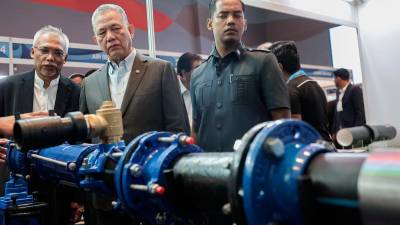KUALA LUMPUR: The Energy Transition and Water Transformation Ministry (Petra) will introduce a digital platform called Pipeline Accountability Portal to provide the public with real-time data on pipeline disruptions, leakage rates and repair timelines, said Minister Datuk Seri Fadillah Yusof.
Fadillah who is also deputy prime minister said the initiative reflects the government’s shift from reactive to proactive regulation by enforcing higher standards for pipeline quality, mandating inspections and publishing outcomes transparently through the portal.
“Trust must be earned and maintained. We need to strengthen public confidence in our water systems. This platform will give the rakyat real-time reporting on disruptions, leakage rates and resolution timelines,” he said at the Malaysian Water Association’s Water Malaysia 2025 Specialised Conference and Exhibition today.
The move comes amid longstanding challenges in Malaysia’s water sector, including high non-revenue water (NRW) rates caused by leakages and aging pipelines.
According to SPAN (National Water Services Commission), Malaysia’s national average NRW has hovered around 35–40% in recent years.
Sabah’s NRW rate stands at 55.1%, the highest in the country, where more than half of treated water is lost before reaching consumers in the state, especially with Perlis (56.3%) and Pahang (52.8%) recording some of the highest levels in the country.
Fadillah said Petra, together with the SPAN, is committed to driving change through a comprehensive policy and regulatory framework anchored on four key pillars:
One: Efficiency First – Efficiency must be integrated from design to operation, considering not just initial costs but also full lifecycle value, environmental impact, and community benefit.
Two: Digital Transformation – Harness IoT sensors, AI driven analytics, and smart DMZs to create responsive, predictive systems that detect leaks early and optimise pressure in real time.
Three: Resilience Planning – Standardise durable materials and design networks that can adapt to climate change, urbanisation, and future needs.
Four: Stakeholder Engagement – Ensure policies and technologies serve people, with inclusive engagement involving communities, regulators, and utilities.
On financing transformation, Fadillah said policy shifts must be backed by funding models that reward innovation.
He added that the government will restructure water utility funding through performance-linked mechanisms that incentivise efficiency and measurable outcomes.
Furthermore, the government will mobilise green investment vehicles, including bonds, to accelerate sustainable infrastructure.
“These are not just financial instruments, but investments in resilience, predictive maintenance and smart infrastructure deployment. The true return will be measured not merely in ringgit, but in trust, sustainability and service excellence for the rakyat,” Fadillah said.
